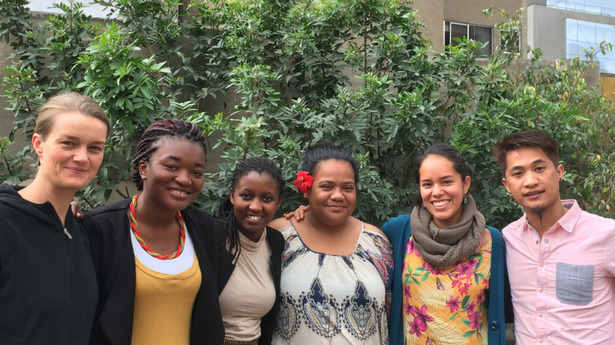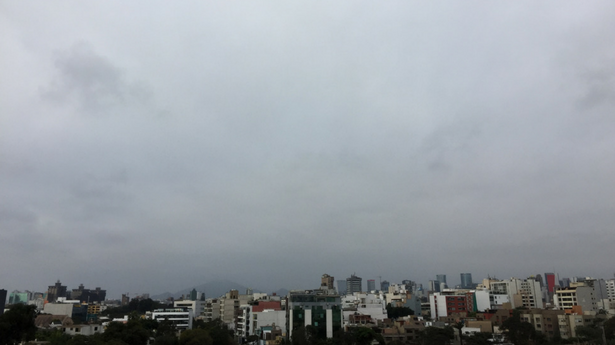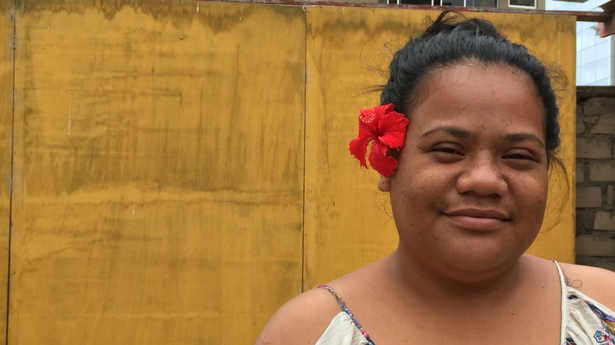Imagine a place where every day the sky is grey and overcast. No sun peeking through, no blue tint of any kind – just one uniformly grey cloud hanging heavy over the land below.
That place exists.
Eight months out of the year, the city of Lima, Peru is shrouded by a grey sky, fondly, or not so fondly referred to as “la panza de burro,” or the donkey’s belly. In the four months of rare sunshine, the locals flock to the beach, happily absorbing every ray of sunshine they can before the grey returns.
The grey sky is the result of a unique microclimate, no precipitation of any kind year-round, and pollution from the 10 million people who call the sprawling city home. The leaves on the trees lining the sidewalks are tinged black from dirt and pollution, and the trees themselves would be unable to grow if the city didn’t send trucks into the streets twice a day to water them. In the lower-income neighborhoods, there are no trees at all.
This June, the Next Generation Climate Board met in Lima for their annual three day board meeting. For a board that provides financial resources to youth groups taking action on climate change, meeting in one of the cities with the most-polluted air in Latin America seemed strangely fitting.
The Next Generation Climate Board is Global Greengrants Fund’s newest board, founded only five years ago. It’s also one of the most globally diverse, with members hailing from Peru, the Philippines, Namibia, Kenya, Tuvalu, and the Arctic. To date, the board has awarded over $350,000 in 31 countries around the world, all to youth activists taking a stand against climate change.
Every member of the board is a passionate local activist in their home countries and communities, and their expertise on the local impacts of climate change come directly from every day exposure. While grey skies, and air and water thick with pollution are a reality for those in Lima, the impacts are highly visible for all of the advisors in the places they call home.
Milikini Failautusi traveled for three days from her home island of Tuvalu to attend the meeting in Lima. Her island is home to only 11,000 people, and when standing in the middle of the island, one can see the ocean on both sides. The local people depend on the sea for food and income, as the cost of importing food onto the island is high due to the distance from other countries. However, increasing ocean temperatures, rising sea levels, overfishing, and an increase in the frequency of natural disasters is severely impacting the local food supply. Milikini is working closely with local youth groups, such as the Pacific Climate Warriors to find relevant solutions.
For Itoah Scott-Enns, the situation in her home town of Yellowknife, Canada is similar. Global warming is causing rapid change to the local landscape, severely impacting wildlife and the people who depend on the land for food. Like the Pacific Islands, it’s very expensive to import food into the remote towns, and the people depend on reindeer and other wildlife for a large part of their diet. Not only are these animals quickly reaching endangered status because of the changing ecosystem, but the melting ice and changing landscape is leading to dangerous conditions for the local people who no longer recognize their lands.
For youth in Kenya and Namibia, extensive drought followed by severe flooding is directly impacting local farmers, access to food, water, and livelihoods. Natural disasters are not only more common, but more forceful, leading to the loss of homes for many local people.
As local leaders in their communities, the Next Generation Climate Board is focused on training youth climate leaders, and helping build the capacity of youth-driven organizations. They help these organizations communicate and collaborate with one another, while also supporting youth activists to have more influence on local, regional and international climate change policy. The board funds youth-driven green enterprises related to climate-change adaptation and mitigation.
As the impacts of climate change grow more severe, and commitment from the United States to take action on global warming wanes, it’s refreshing to see grassroots action building from young people around the world. Our future depends on our ability to take action now, and young people in the communities supported by the Next Generation Climate Board are in active pursuit of cutting-edge climate change initiatives on a global scale.



